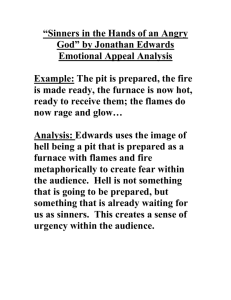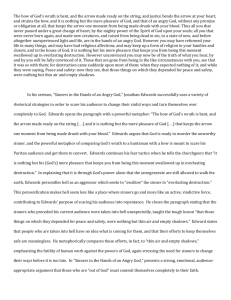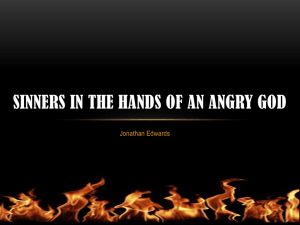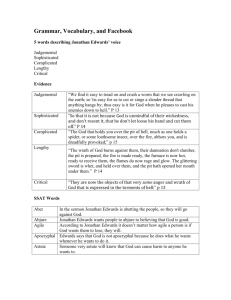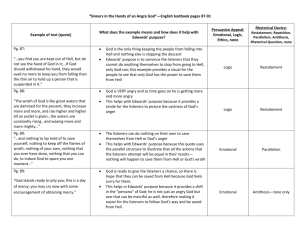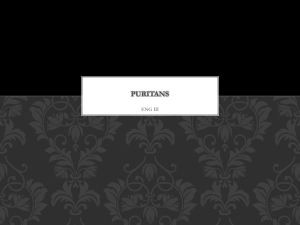Sinners in the Hands of an Angry God
advertisement
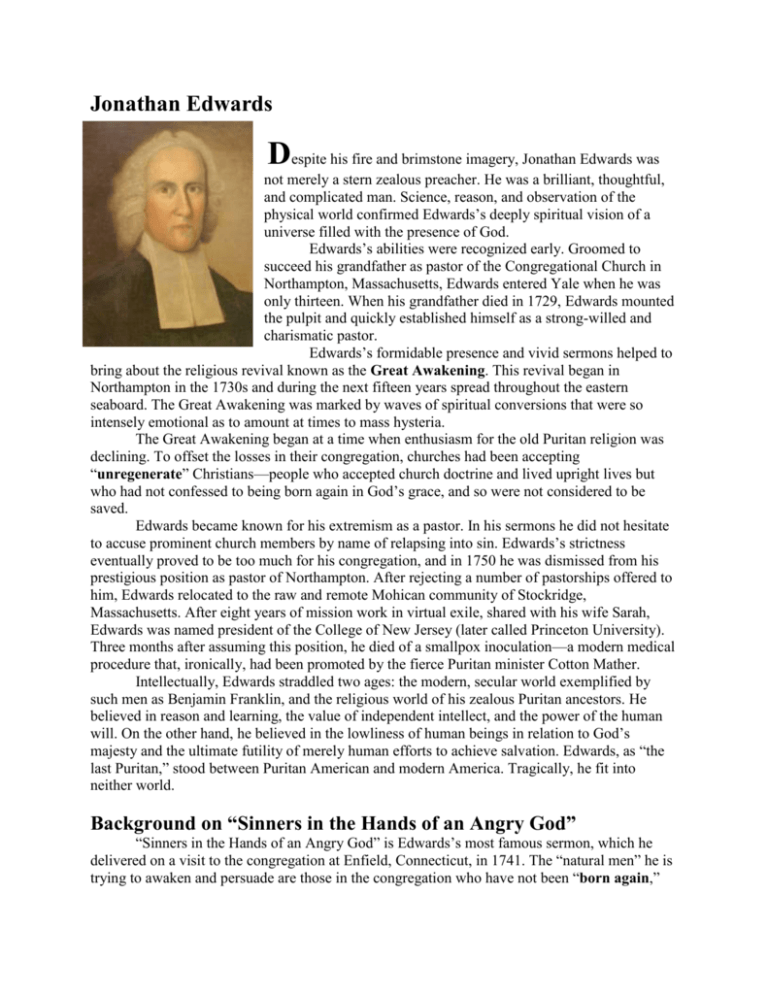
Jonathan Edwards Despite his fire and brimstone imagery, Jonathan Edwards was not merely a stern zealous preacher. He was a brilliant, thoughtful, and complicated man. Science, reason, and observation of the physical world confirmed Edwards’s deeply spiritual vision of a universe filled with the presence of God. Edwards’s abilities were recognized early. Groomed to succeed his grandfather as pastor of the Congregational Church in Northampton, Massachusetts, Edwards entered Yale when he was only thirteen. When his grandfather died in 1729, Edwards mounted the pulpit and quickly established himself as a strong-willed and charismatic pastor. Edwards’s formidable presence and vivid sermons helped to bring about the religious revival known as the Great Awakening. This revival began in Northampton in the 1730s and during the next fifteen years spread throughout the eastern seaboard. The Great Awakening was marked by waves of spiritual conversions that were so intensely emotional as to amount at times to mass hysteria. The Great Awakening began at a time when enthusiasm for the old Puritan religion was declining. To offset the losses in their congregation, churches had been accepting “unregenerate” Christians—people who accepted church doctrine and lived upright lives but who had not confessed to being born again in God’s grace, and so were not considered to be saved. Edwards became known for his extremism as a pastor. In his sermons he did not hesitate to accuse prominent church members by name of relapsing into sin. Edwards’s strictness eventually proved to be too much for his congregation, and in 1750 he was dismissed from his prestigious position as pastor of Northampton. After rejecting a number of pastorships offered to him, Edwards relocated to the raw and remote Mohican community of Stockridge, Massachusetts. After eight years of mission work in virtual exile, shared with his wife Sarah, Edwards was named president of the College of New Jersey (later called Princeton University). Three months after assuming this position, he died of a smallpox inoculation—a modern medical procedure that, ironically, had been promoted by the fierce Puritan minister Cotton Mather. Intellectually, Edwards straddled two ages: the modern, secular world exemplified by such men as Benjamin Franklin, and the religious world of his zealous Puritan ancestors. He believed in reason and learning, the value of independent intellect, and the power of the human will. On the other hand, he believed in the lowliness of human beings in relation to God’s majesty and the ultimate futility of merely human efforts to achieve salvation. Edwards, as “the last Puritan,” stood between Puritan American and modern America. Tragically, he fit into neither world. Background on “Sinners in the Hands of an Angry God” “Sinners in the Hands of an Angry God” is Edwards’s most famous sermon, which he delivered on a visit to the congregation at Enfield, Connecticut, in 1741. The “natural men” he is trying to awaken and persuade are those in the congregation who have not been “born again,” meaning that they have not accepted Christ as their savior. Edwards’s methods in the sermons were influenced by the work of philosopher John Locke (1632-1704). Locke believed that everything we know comes from experience, and he emphasized that understanding and feeling were two distinct kinds of knowledge. (To Edwards, the difference between these two kinds of knowledge was like the difference between reading the word “fire” and actually being burned.) Edwards’s sermon had a powerful effect on the congregation; several times he had to ask his shrieking and swooning audience for quiet. Adapted from: “Jonathan Edwards.” Elements of Literature, Fifth Course. Thomas F. Hirsch and Patricia McCambridge Eds. Austin: Holt, Rinehart, and Winston, 2000.79-80. Sinners in the Hands of an Angry God By Jonathan Edwards …So that thus it is that natural men held in the hand of God over the pit of hell; they have deserved the fiery pit, and are already sentenced to it; and God is dreadfully provoked: His anger is as great towards them as those that are actually suffering the execution of the fierceness of His wrath in hell; and they have done nothing in the least to appease or abate that anger, neither is God in the least bound by any promise to hold them up for one moment. The devil is waiting for them, hell is gaping for them, the flames gather and flash about them, and would fain lay hold on them, and swallow them up; the fire pent up in their own hearts is struggling to break out; and they have no means within reach that can be any security to them. In short they have no refuge, nothing to take hold of; all that preserves them every moment is the mere arbitrary will, and uncovenanted, unobliged forbearance of an incensed God. The use of this awful subject may be for awakening unconverted persons to a conviction of their danger, this that you have heard is the case of every one out if Christ. That world of misery, that lake of burning brimstone, is extended abroad under you. There is the dreadful pit of the glowing flames of the wrath of God; there is hell’s wide gaping mouth open; and you have nothing to stand upon, nor anything between you and hell but the air; it is only the power and mere pleasure of God that holds you up. You are probably not sensible of this; you find you are kept out of hell, but do not see the hand of God in it, but look at other things, as the good state of your bodily constitution, your care of your own life, and the means you use for your own preservation. But indeed these things are nothing; if God should withdraw His hand, they would avail no more to keep you from falling, than the thin air to hold up a person who is suspended in it. Your wickedness makes you, as it were, heavy as lead, and to rend downwards with great weight and pressure towards hell, and if God should let you go, you would immediately sink, and swiftly descend and plunge into the bottomless gulf; and your healthy constitution, and your own care and prudence, and best contrivance, and all your righteousness, would have no more influence to uphold you, and keep you out of hell, than a spider’s web would have to stop a falling rock…. The wrath of God is like great waters that are restrained for the present; but they increase more and more, and rise higher and higher, till an outlet is given; and the longer the stream is stopped the more rapid and mighty is its course when once it is let loose. It is true, that judgment against your evil works has not been executed hitherto; the floods of God’s vengeance have been withheld; but your guilt in the meantime is constantly increasing, and you are every day treasuring up more wrath; the waters are constantly rising and waxing more and more mighty; and there is nothing but the mere pleasure of God that holds the waters back, that are unwilling to be stopped, and press hard to go forward. If God should only withdraw His hand from the flood-gate, it would immediately fly open, and the fiery floods of the fierceness and wrath of God, would rush forth with inconceivable fury, and would come upon you with omnipotent power; and if your strength were ten thousand times greater than the strength of the stoutest, sturdiest devil in hell, it would be nothing to withstand or endure it. The bow of God’s wrath is bent, and the arrow made ready on the string; and justice directs the bow to your heart, and strains at the bow: and it is nothing but the mere pleasure of God, and that of an angry God, without any promise or obligation at all, that keeps the arrow one moment from being made drunk with your blood. Thus all you that never passed under a great change of heart, by the mighty power of the Spirit of God upon your souls; all you that were never born again, and made new creatures, and raised from being dead in sin, to a state of new, and before altogether unexperienced light and life, are in the hands of an angry God. However you may have reformed your life in many things and many have had religious affections, and may keep up a form of religion in your families and closets, and in the house of God, it is nothing but His mere pleasure that keeps you from being this moment swallowed up in everlasting destruction. However unconvinced you may now be of the truth of what you hear, by and by you will be fully convinced of it. Those that are gone from being in the like circumstances with you, see that it was so with them; for destruction came suddenly upon most of them; when they expected nothing of it, and while they were saying, Peace and safety, Now they see, that those things on which they depend for peace and safety, were nothing but thin air and empty shadows. The God that holds you over the pit of hell, much in the same way as one holds a spider, or some loathsome insect, over the fire, abhors you, and is dreadfully provoked; His wrath towards you burns like fire; he looks upon you as worthy of nothing else but to be cast into the fire; He is of purer eyes than to bear to have you in His sight; you are ten thousand times more abominable in His eyes than the most hateful venomous serpent is in ours. You have offended Him infinitely more than ever a stubborn rebel did his prince; and yet, it is nothing but His hand that holds you from falling into the fire every moment. It is to be ascribed to nothing else, that you did not go to hell the last night; that you were suffered to awake again in this would, after you closed your eyes to sleep; and there is no other reason to be given, why you have not dropped into hell since you arouse in the morning, but that God's hand has held you up. There is no other reason to be given, but His mercy; yea, no other reason can be given why you do not this very moment drop down into hell. O sinner, consider the fearful danger you are in! It is a great furnace of wrath, a wide and bottomless pit, full of the fire if the wrath that you are held over in the hand of that God whose wrath is provoked and incensed as much against you as against many of the damned in hell. You hang by a slender thread, with the flames of divine wrath flashing about it and ready every moment to singe it, and burn it asunder; and you have no interest in any Mediator, and nothing to lay hold of to save yourself, nothing to keep off the flames of wrath, nothing of your own, nothing that you have done, nothing that you can do, to induce God to spare you one moment. “Sinners in the Hands of an Angry God” Directions: Please write your answers on a separate sheet of paper _________________________________________________ PART A: Summary In a paragraph summarize the author’s main argument, his purpose for writing the sermon, and the persona he assumes throughout his essay. Use evidence from throughout the text to support your response. PART B: Textual Evidence: Using Quotations to Support Statements Based upon your reading of “Sinners in the Hands of an Angry God,” by Jonathan Edwards, consider whether the following statements are true or false about Puritan theology. Then, write down a passage from the sermon upon which your opinion is based. 1. Good works will get you salvation. True/False Supporting passage: 2. Everyone deserves to burn in the fiery pit. True/False Supporting passage: 3. Edward’s intended audience is everyone. True/False Supporting passage: 4. God is a loving God. True/False Supporting passage: 5. Prayer and biblical study will help one to become blessed and saved. True/False Supporting passage: Offer a thorough response to each of the following. Use evidence from throughout the text to support your response 6. Identify the simile or metaphor you believe is most effective and explain why. Use evidence from throughout the text to support your response 7. Is there hope for this Puritan congregation? Use evidence from throughout the text to support your response.
